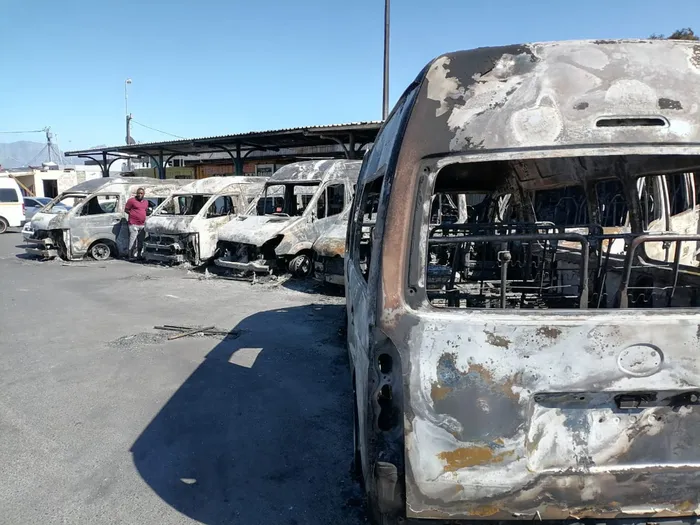Western Cape Taxi Conflict: A Tale of Violence, Crime and Corruption

Taxis belonging to the Cape Amalgamated Taxi Association (CATA) were set alight at Nyanga taxi rank recently. The minibus taxi industry is being weaponised, not only to move people but to assert territorial dominance, launder money, and eliminate opposition, says the writer.
Image: IOL
Benson Ngqentsu
Cape Town has long been marred by waves of violence in the minibus taxi industry. Despite repeated interventions over the years, the sector remains engulfed in instability, with bloodshed often spilling into the lives of innocent commuters and communities.
In April 2005, then-Premier Ebrahim Rasool established a Commission of Inquiry into taxi violence, chaired by Advocate Dumisa Ntsebeza. The commission was tasked to investigate the underlying reasons for the violence that has plagued the industry; secondly, to identify the people or groups who are instigating or responsible for the violence, and thirdly, to establish the structural and institutional factors that contribute to the conflict. Nearly two decades later, the commission’s findings remain disturbingly relevant.
The report revealed a deeply entrenched culture of lawlessness within the industry marked by fear, silence, and the use of hit squads. Most damning was the systemic failure to bring to justice those who orchestrate and benefit from the violence. These were not isolated incidents, but the symptoms of a broken, compromised system.
The recent assassination of CATA regional secretary Mr Mongi Titi (to whom this article is dedicated), the torching of 18 minibus taxis, and the ongoing killings in areas such as Vrygrond/Capricorn are not random. They are manifestations of a deeper crisis left to fester, evidence of an underworld where violence is a means of control, and accountability remains elusive.
It is increasingly evident that this violence is not sustained solely by internal opponents. Instead, it points to a far more troubling nexus: an intersection of criminal networks, rogue taxi industry figures, and corrupt elements within the criminal justice system.
For instance, when investigations are repeatedly stalled and prosecutions fail, despite patterns of violence and ample evidence, one must ask: who is shielding the perpetrators and for whose interests?
Further, what was once a crisis within the transport industry has now become a national concern. It strikes at the very heart of public safety and undermines the integrity of our law enforcement institutions. The minibus taxi industry is being weaponised, not only to move people but to assert territorial dominance, launder money, and eliminate opposition.
If the government is truly committed to restoring order, it must confront this convergence of criminality and corruption directly. This requires more than temporary task teams or crisis mediation.
It demands the full implementation of the Ntsebeza Commission’s recommendations, especially the call for the establishment of a permanent, multi-disciplinary investigative unit constitutive of the South African Police Service, the South African Revenue Service, the National Prosecuting Authority, and the Intelligence Services. Its primary mandate must be to monitor, investigate, and dismantle the tentacles of the networks of taxi warlords responsible for ongoing violence and other criminal activities.
Until this is done, the minibus taxi industry will always be condemned as an industry of warlords rather than a sector of the economy, lives will continue to be lost, communities will remain under siege, and credible leaders committed to transformation like Mongi Titi, and others will continue to perish and public trust in the justice system will continue to erode.
* Benson Ngqentsu is the SACP’s Provincial Secretary and spokesperson for Mobility and Police Oversight in the Western Cape Provincial Legislature on behalf of the ANC-led alliance.
** The views expressed do not necessarily reflect the views of IOL, Independent Media or The African.